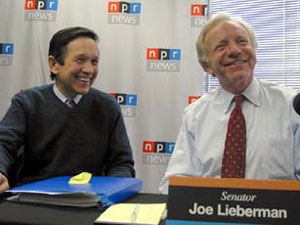Photos
More from MPR
Resources
Your Voice
| |||||||||||||||||||||||||||||||||
Democratic challengers meet in radio-only debate
January 6, 2004
Des Moines, Iowa — (AP) Howard Dean and Dick Gephardt drew fire in campaign debate Tuesday from rivals accusing them of advocating higher taxes on the middle class. Dean called the charge "hogwash."
 | |||
"Howard Dean and Dick Gephardt's proposals to get rid of the (Bush) tax cuts raise taxes in several different ways," Sen. John Kerry of Massachusetts said in the second campaign debate in three days. `Nothing Howard is proposing lowers that burden." "I don't know of a case where a Democratic candidate for president has been elected who called for a massive increase in taxes on the middle class," added Sen. Joseph Lieberman of Connecticut. "These are our people," he said, referring to millions of middle-class taxpayers.
Yet another Iowa debate is scheduled for Sunday, reflecting the intensification of the campaign before the state's kick-off caucuses on Jan. 19. The caucuses and the first-in-the-nation New Hampshire primary eight days later will likely winnow the field of Democratic contenders, dispatching some of the also-rans to the sidelines while other contenders advance to later contests.
 | |||
NPR's Neal Conan served as moderator for the two-hour radio debate, which ranged ranged broadly over foreign policy, economics, trade and other issues. The six contenders sat around a U-shaped table in a studio in the Iowa capital, fielding questions submitted by the listening audience.
They found agreement on one point - all favoring limits on the number of snowmobiles in Yellowstone National Park. Even then, Dean sought to stand apart from his rivals in Congress, saying the restrictions should be made by government experts rather than Congress.
Dean and Gephardt both advocate repealing the tax cuts Bush has pushed through Congress, some of which benefit middle class taxpayers. Gephardt also has said he would recommend passage of some new breaks to cushion the blow.
 | |||
The debate over the issue was intense, with Kerry and Lieberman eager to draw a distinction with Dean and Gephardt, the two men atop the polls in Iowa. And Lieberman, who has announced he won't compete in the caucuses, said he was the only contender to advocate new tax cuts for the middle class and offer a way of paying for them.
For his part, Gephardt went after Kerry for proposing a Social Security tax holiday for workers and their employers. "I think that's a risky proposal," he said. "I don't see how we beat George Bush if we're going to undermine the Social Security system as part of our tax system."
Kerry countered that Gephardt was referring to an early proposal that was designed to give a tax break to Americans who don't earn enough to pay income taxes.
Dean's "hogwash" rebuttal was designed to counter Kerry's claim that the repeal of all of Bush's tax cuts would raise the tax burden on the middle class, without effectively dealing with other financial burdens such as the cost of college tuition.
 | |||
For the second debate in a row, Lieberman seemed particularly eager to challenge Dean, saying the former Vermont governor had "said some things that are polarizing. He has represented anger. Anger has fueled his campaign," Lieberman said, offering no examples.
Also for the second debate in a row, Dean sought to strike a calm, front-runner's pose. But he showed a flash of frustration when Gephardt renewed charges that he would fail to protect Medicare.
"I will not cut Medicare. Period. I will not cut Medicare, Dick, I want to make that clear," he said to Gephardt, who accuses him of siding with the congressional Republicans in 1995 when they sought to do precisely that.
"We'll talk about trade later," Dean added. Gephardt has accused Dean of flip-flopping on the issue of free-trade agreements.
 | |||
Dean began his day in New Hampshire, where he picked up the endorsement of former Sen. Bill Bradley of New Jersey, who lost his battle for the Democratic presidential nomination to former Vice President Al Gore in 2000. Gore endorsed Dean last month, one of a series of events that helped burnish the former Vermont governor's credentials as the front-runner for the nomination to challenge President Bush this fall.
The former Vermont governor referred to the twin endorsements at one point, saying that he alone is able to attract supporters across the Democratic spectrum.
"If I can begin to breach the gap between Bill Bradley and Al Gore, and bring in people who have served long periods of time in Washington, and all the enthusiastic supporters we have, then I think I may be the right candidate to beat George Bush," Dean said.
The stakes in Iowa are particularly big for Gephardt, the former House Democratic leader who won the caucuses in a previous bid for the presidency in 1988. He has predicted flatly on numerous occasions he will win again, and his aides acknowledge that he must.
But public and private polling indicates Dean has pulled even or perhaps ahead in the state. Additionally, Kerry and Sen. John Edwards of North Carolina are both campaigning exhaustively in the state, hoping for a late surge. Lieberman and Wesley Clark have both decided to skip the caucuses, looking to New Hampshire and other states to propel them to the nomination.
Dean, Gephardt, Kerry, Lieberman, Carol Moseley Braun and Dennis Kucinich of Ohio participated in the debate, while Clark, Edwards and Al Sharpton did not.
The first segment of the event was more panel discussion than debate as all six of the Democratic hopefuls lashed Bush's foreign policy.
Dean said Bush was pursuing a policy that will "allow North Korea to become a nuclear power," Kerry said the president has failed to give enough emphasis to nuclear nonproliferation and Lieberman said Bush has been "woefully disengaged" from efforts to reconcile India and Pakistan, two countries at dagger-point on the Asian subcontinent.
|
News Headlines
|
Related Subjects
|


